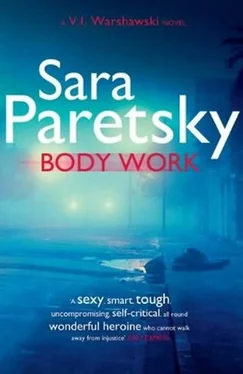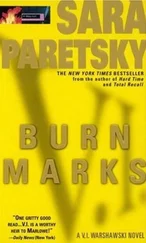“Petra, we seem to keep having a version of this conversation. Surely, under the circumstances, you could take some money from your mother while you find work.”
“She’s totally wound up with my dad’s trial right now. I’m not going to bother her about stuff I can handle on my own.”
I wondered if Petra was unconsciously hoping to get into enough trouble at Club Gouge to force her mother to start paying more attention to her. I started to say something, then decided my armchair psychology would further raise my cousin’s hackles.
“Petra, even in this economy money isn’t everything. It isn’t worth a jail term, or worse. This guy Rodney, Olympia both fears him and protects him. And he and Olympia are involved in something rotten. You came to me last week because she was essentially demanding that you let him feel you up. Now it’s-”
“You got that to stop, everything’s been okay lately.”
“‘Okay’?” I squawked. “A murder is okay? Your boss threatened your job if I show up, which means she’s got something going on she’s afraid I’ll uncover. That is not okay. That’s a recipe for disaster. If Olympia is providing cover for a money-laundering scheme, you could end up in front of the grand jury. You could even be implicated!”
“Then my big grumpy cousin will come to my rescue, won’t she?”
I could picture Petra’s face, the self-mocking pout she puts on when she knows she’s being a brat. The trouble was, of course, I would come to her rescue. And she was banking on that. Growing up the way I did, my mother dying when I was in high school, my father forced to turn the house and meals over to me, I felt as though I’d been born old. I was tired of my own knee-jerk reaction. You’re in trouble? Say no more. V.I., the grumpy cousin, will bail you out! I wished I knew how to turn off that particular switch.
I wondered for a moment if my whole detective practice was built on my private history of being an adolescent caretaker. The thought upset me so much that I couldn’t keep an edge of fury out of my voice when I spoke.
“Petra, call me the next time the Body Artist is going to appear. It’s not a lot to ask considering how much hot water you’re willing to get me in.”
“Uh, well, actually, it’s tomorrow night.” Petra spoke in a kind of mumble that made it hard to understand her. “She’s doing a special show because Olympia got so pissed off about her erasing Rodney’s stuff last night.”
Petra cut the connection. I put the car into gear and started down Milwaukee Avenue. The bitter winter was acting like a wrecking ball on the city streets, as if a band of hyper-energetic gnomes were hacking their way to the surface, choosing new spots every night. I was almost half an hour late to the Golden Glow, but I did find an open space across the street. Parking had also become a source of bitterness in the city-the mayor suddenly sold street parking to a private firm, which had quadrupled the rates overnight. We all had to carry bags of quarters everywhere we went, as if we were heading for slot machines, which I guess the pay stations had become. Slot machines completely and permanently skewed in the house’s favor.
Murray was already in the Glow when I got there, drinking a Holstein. The nasty weather had kept all but a handful of hard-core drinkers at home, so Sal had pulled up a stool next to his. Murray lifted the bottle in a token greeting but didn’t get to his feet.
“Beer in this weather!” I said. “It makes me feel colder just watching you drink it.”
“Warms me up.” He grinned. “I imagine the seat behind third base, the July sun as hot as your temper, the Cubs-”
“Trailing hopelessly, Lou Pinella’s iron jaw shooting sparks. I get the picture.”
Sal reached across the mahogany countertop for the Black Label bottle. “How much does Murray know?”
“Try me,” Murray said. “Who had the worst ERA for the 1987 Cubs? Who died first, Leopold or Loeb?”
“I don’t think we can trust Murray,” I said to Sal. “He’s too desperate for a story.”
Murray snatched the Black Label bottle from Sal before she could pour me a drink. “Deliver, you two feminazis, or you’ll never see this bottle alive again.”
“Do we go quietly or break his arms?” Sal said.
A lifted glass sent her to a corner table with a bottle of wine. When she came back, she said to me, “You know, I told you the other night that your friend was a good manager, but that was old news, dating back to the Aurora Borealis.”
“Olympia, Club Gouge.” Murray’s smile was smug. “I can still do research even if no one wants to print my stories.”
“She got in over her head. And then a benefactor pulled her to shore,” I said.
I told Murray and Sal about Rodney, and asked Murray if he’d tracked the license plate from the sedan Rodney had been driving the night before. “Did you get his last name or an address?”
“The sedan belongs to a guy named Owen Widermayer, who’s a CPA with an office in Deerfield and a home in Winnetka,” Murray said. “Owen does not have a criminal record, and no one named Rodney works for him.”
“They’re lovers, then.” I copied Widermayer’s address into my handheld. “I don’t understand what Rodney is trying to communicate through Karen Buckley’s body. But maybe Widermayer will talk to me and it will suddenly make sense.”
While Sal went over to check on her other customers, I showed Murray the numbers I’d found on the Body Artist’s site. He puzzled over them with me but couldn’t offer any suggestions. And he had the same objection I did: If it was a code of some kind, why rely on such crude transmission. Why not use a cell phone or the Net, where you knew you’d reach your target. Or if you were afraid of eavesdroppers and hackers, why not write a letter?
Sal came back and offered me another drink, but it was getting close to ten; despite my nap earlier, I was beat. Once again, I took the side streets home. A few lazy snowflakes were falling, just enough to cover my windshield from time to time. The blurry view just about matched what was going on in my head.
Before getting ready for bed, I went to the safe I’d built into my bedroom closet. It’s where I keep my mother’s few valuable bits of jewelry and my handgun. I pulled out the Smith & Wesson and looked it over to make sure it was clean. I put in the clip, double-checked the safety, and laid it on the nightstand next to my bed. It was starting to feel like that kind of case.
20 An Egghead Enters the Scene
In the morning, I drove to the northwest suburbs under a sun that dazzled and blinded. I brought along Mitch and Peppy; before going to Owen Widermayer’s offices near the Tollway, I stopped at the Forest Preserve in Winnetka. We ran down to the lagoons, which were frozen solid enough to hold my weight, and covered with a dusting of snow that provided traction.
None of us had had much exercise the last few days, and I was glad for the chance to run. The dogs rolled in the snow and chased after balls, which bounced high on the ice. We passed people on cross-country skis who cheered us on-everyone’s spirits were better for this rare day of bright sunshine.
As we moved on, I sang “Un bel di” just because the beautiful day brought the words to mind. Yet a sense of menace underlies that aria, and menace seemed to rise up and greet me when I reached Widermayer’s building. The address board listed two tenants for the second floor: Owen Widermayer, CPA, and the Rest EZ company.
I don’t know every sleazy operation in Illinois, but Rest EZ was hard to overlook. About eight months ago, the owner, Anton Kystarnik, had been in the middle of a messy divorce when his wife conveniently died in a small-plane crash. Investigators came to the reluctant conclusion that it had been a genuine accident. I’d followed the story with the same enthusiasm as every other conspiracy theorist, learning along the way that Kystarnik’s wealth came from payday loans, which, in my book, are just juice loans that aren’t conducted in alleys.
Читать дальше












